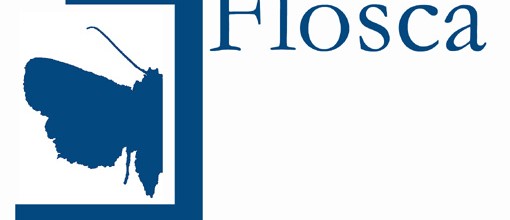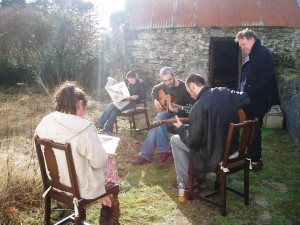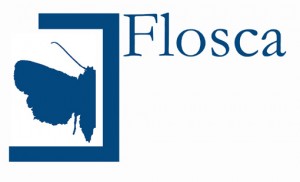

Focus on new opportunities.
Every so often a writer gets to hear about some new publishing initiative – most of them remain just that, ‘things you get to hear about’ because the hard work and determination required to get even the smallest literary project off the ground are impossible to overestimate – trust me, I’ve been involved in enough ‘new initiatives’ to know. But at least three exciting new possibilities are opening up in the UK and over the next few months I shall be exploring each of them, I hope in some depth, with their founders.
First up is Flosca – part publishing house, part collective, home of two new writing competitions (yes, I thought you’d spot that and zoom in, dear reader!) and a forum. I asked the collective for an interview, and Jean Kennedy Smith agreed to field my questions and gather responses from some other collective members. She’s a writer living in Galway, Ireland, who received a BA from Sarah Lawrence College in 2001, and held a series of jobs in art galleries and auction houses in Manhattan. She moved to Galway in 2005 to receive her Masters in Writing at the National University of Ireland, Galway. Her work has been published in local journals, including Ropes Galway and the chapbook The Whole Building Could Be on Fire. She is currently working on her first novel. She is also – and for my purposes, most importantly – the Secretary of Flosca Teo.
Why did you get into publishing?
Flosca was started by the fifteen members of our Masters in Writing course at NUIG. We are a disparate group, ranging in age from 60 to 22, coming from various places in Ireland, England, the United States and Canada. Despite our difference in age, nationality and background, we had amazing chemistry as a collective in terms of literary discussions, workshops, and overall support for each other as writers.
As we were each preparing to graduate and face the perilous life that awaits the working writer, we realized that we could extend our community and network with aspiring writers on a larger scale. Flosca is a unique enterprise in the publishing world in that we approach the business from a place of sympathy toward the writer’s plight. The notion of ‘marketability’ is not our driving force—we are far more interested in encouraging dialogue, experimentation, and hearing new voices.
What’s the best thing about being a publisher, so far?
We just launched our first two writing competitions, the Flosca Short Story Competition and the Flosca Irish Language Poetry Competition. The anticipation of receiving more and more submissions, and discovering new writing/writers, is the most exciting thing.
And what’s the worst thing?
The most difficult part is getting our name out there on a limited budget! The new writing contests, with David Means as short story and Liam O’Muirthile as Irish poetry judges, offer such great new opportunities for writers that we want to give as many people as possible a chance to submit, so we are relying greatly on word of mouth and the power of the Internet.
Who do you most admire as a writer, and why?
My own favourites include Joseph Mitchell, Flannery O’Connor, Jean Rhys, James Salter and J.D. Salinger. I could go on about each of them for ages, but I suppose what appeals to me about the lot of them is that I find each of their writing relatable– lucid and honest, and with a certain heartbreaking quality.
This is just my own particular taste, though. I asked some of the other Flosca members and their answers include James Joyce, Octave Mirbeau, Albert Camus, Russell Hoban, William Trevor, F. Scott Fitzgerald, Annie Proulx, Theodore Roethke and Harper Lee. Our taste has a really broad range, but our discussions about who we admire and why has really helped us pare down our own different intentions as writers. This is the pursuit of the Flosca Forums, as well – to encourage literary discussion, in order for writers to figure out what work they respond to and why.
What advice would you give somebody who is thinking of getting into publishing?
Go into it without too much emphasis on the commercial aspect of literature. When writers are encouraged to approach the craft in terms of what is marketable, it does everyone a disservice.
And what advice would you give writers hoping to be published?
To write, to continue writing, and to get your work into the world by any means possible. We all know how daunting it can be to face rejection, but there are so many resources out there to get your work seen.
Is there something else you can see yourself doing if you weren’t a writer/publisher?
We do all wear hats that are not related to publishing/writing. Given the choice, I know we’d all love to be published, celebrated, and financially independent enough to write full-time. In reality we all have other pursuits that sustain and nurture our craft, as well as get the rent paid: we have a PhD student, a technical writer, a visual artist, two mothers of small children, a musician, an entrepreneur, a Box Office manager, a baker, and an I.T. guy, among others.
If you were abandoned on a desert island, with just one book for company, what would it be?
My choice would be East of Eden, by John Steinbeck. It is such a beautiful book, and so big in scope I could read it a few times before I resented being stranded, and they’d eventually have to pry it from my skeletal fingers.
Other Flosca members said:
“Ludwig Wittgensein’s Tractatus still amazes me, however flawed it’s been proven to be, and despite the fact that Wittgenstein renounced it in later years as erroneous, just for a slice of sheer logic, for something I’ve haven’t fully grasped yet and it’s philosophy of language. I think I’d go for the Tractatus.” C.N.
“I’d be practical and bring Stephen King’s unabridged The Dark Tower, because it accumulates about 3500 pages (I’d presumably have plenty of time to read), is exciting and incredibly well imagined and beautifully written and is a Postmodern Western; it is also built on and influenced by some of my favourite artistic works (The Wizard of Oz, Cormac McCarthy’s Blood Meridian, The Magnificent Seven, Bob Dylan, Eliot’s The Waste Land, and a lot of the Bible too.). Plus the hero is based on Clint Eastwood’s character in the Few Dollars More trilogy. And by the time you get to the end you’re bursting to just start and read it all again and figure out how King was able to do all the things he did to you in the book and because you love the characters so much you just want to spend more time with them.. If I couldn’t bring that, I’d bring John Moriarty’s Turtle Was Gone a Long Time, and spend my days trying to figure out what it was about.” D.D.
“Huckleberry Finn, by Mark Twain. There is some good alchemy regarding the construction of rafts.” B.McC.



1 Comment
TitaniaWrites
17th May 2007Kay -thanks so much for bringing these new opportunities to our notice. Welcome, Flosca, the initiative sounds wonderful. I just found your website http://www.flosca.com. I will spread the word!
Tania